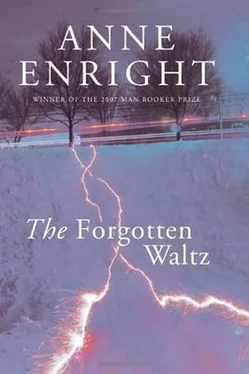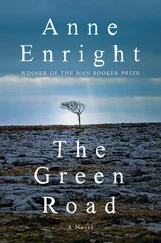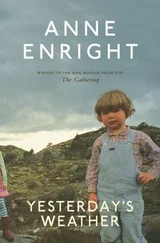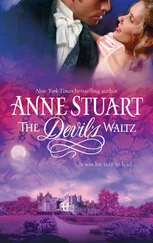She eats nothing she is asked to eat, and everything that is forbidden. But she eats. Which I consider a minor miracle. She filches, she sneaks and crams. She waits – a bit like myself, indeed – until her father is not there. The place we meet most often is at the fridge door.
Two months ago, when Seán was at the gym and Evie was complaining I had finished all the mayonnaise, I tossed my bag on the kitchen table and said, ‘Why don’t you go and buy your own fucking food?’
Not pretty, but true.
Evie looked at me, as though noticing me for the first time. Later that day, she said something to me – something that wasn’t just a whine, like, ‘Why don’t you have Sky TV?’
She said, ‘I can’t believe you have so many shoes.’
And I had to leave the room to stuff my knuckles in my mouth, and pretend to bite into them, behind the door.
* * *
I look for my hiking boots and find them eventually on a shelf, wrapped up in a paper bag that came all the way from Sydney. I have not worn them since: my life, it seems, took the kind of turn that can only be effected in high heels. I take them out of the bag and the red dust of Australia shakes out on to our kitchen floor. My dreaming boots. I put them on and walk outside.
The afternoon snow has a shining crust that gives underfoot as I cross the garden and open the gate and join all the other tracks on the path into town. The slush has frozen back to ice in the shade and the difficulty pulls my eyes constantly downwards. I take one treacherous step after the next, and for the first while, I can not shake the rant.
It’s hard, taking second place to a child – it was bad enough taking second place to her mother – and I remember what Seán said about me in his report to Rathlin Communications (now deceased – the ironies in that), when I took a sneaky look, and read where he had written – there was much praise there too, of course – that I was ‘most ideally suited to a secondary role’.
That stung.
They underestimate me, I think. They underestimate my tenacity.
On Rathmines Road there is grit under my feet and the paths are walked clear. There aren’t many cars, but the buses are running, and they leave moraines of dirty slush on either side of the road.
I pass the Observatory Lane, a shanty row of shops, BlackBerry Lane; the rugby pitches in front of St Mary’s glutted with snow. The clouds have cleared, the sky is high and blue, the green dome of Rathmines church is still capped with white. The canal cuts a clean line under the bridge, the black water reflects the frozen water on its banks, and I am glad of the fresh air, my dreaming boots walking me into Dublin town. I remember the first Aborigine I saw, after maybe a week in Sydney, how very black he was and how very poor: you travel so far to realise that it’s all true, all of it, like my father in his last days, It is just as you always suspected .
But we weren’t wrong to hope, myself and Conor, back in our Australian days. And I am not wrong to hope, now: to hold on to Seán, and love him, and to try to love his daughter.
She is there at the bus stop, as arranged, talking on the phone. I recognise her immediately and then see, afterwards, what she is: a schoolgirl who is not allowed to walk down a city-centre street alone – not even in the snow, when the monsters that wait for schoolgirls surely have other things on their minds. I feel like taking her drinking. I feel like telling her to get out now, while the going is good. Not bother growing up.
Turn back! It’s a trap!
She spots me and puts away the phone. I see that she is wearing, on this cold day, almost nothing. A short denim skirt, opaque tights, a little black cotton jacket, a gingham scarf with added bobbles and metallic threads. Her only concessions to the freezing weather are black fingerless gloves and Ugg boots. Maybe her coat is in her backpack. I can only imagine the fight before she left the house.
‘Uggs!’ I say, coming up to her. ‘It comes to us all.’
To which she gives a long-suffering smile.
I am beginning to understand Evie’s silences, which come in many varieties. Her chat, on the other hand, is endlessly the same: hard to listen to and harder still to remember. I don’t know how Seán stays sane. It is mostly comprised of opinions, as she sifts through likes and dislikes of the kind you can choose on MTV: I don’t like this, I really like that. My friend Paddy says she really likes this, and I’m like, ‘How can you like that?’ This is mixed with scenes from movies, some small problems about the future of the planet, and some large problems about the dragon game she used to play online but doesn’t now because no one is into that anymore. She is into being into things. She is majorly into unfairness – an ardent egalitarian, anti-designer label, anti-bullying – her friend Paddy, she says, agrees with her about all of this (her friend Paddy, she says, in pretty much the same breath, always travels business class).
I feel that the world might be better if it was run by girls who are nearly twelve, the ability they have to be fully moral and fully venal at the same time. Capitalism would certainly thrive.
‘Do you want to look around the shops?’ I say, and get a response that is alert, almost animal. ‘OK.’
‘Where do you want to go?’
A look around the shops means, it turns out, for Evie, a look at shops that sell cheap soap; either ecologically aware, or freshly made.
We walk across to Grafton Street in silence.
‘You got the bus OK?’
Until we pass a baby in a little pram.
‘Ngaaawww,’ she says.
Evie’s interest in babies is so keen, it might be cause for concern, except for the fact that she is twice as interested in dogs.
She can not pass a baby without living a moment in their skin: ‘He doesn’t like the cold,’ she says, or, ‘Her hat is over her eyes,’ or just, ‘Ngawww!’ I think she is unusual in this, and I don’t know where it will all end.
‘Did you hear from your Dad?’
‘Em.’
‘Did he say when he was going to be home?’
‘I think he said he was on the plane.’
I leave her to the rows of smelly bottles; the untwiddling of caps, the sniffings and little rubbings that the shop requires. Moisturisers, toners, exfoliators: she is out of her depth, I realise, and a little disappointed by it all.
‘I think it’s time,’ I say. ‘To up your game.’ And I bring her down the street and into one of the posh shops, and a rack of perfume that she studies with quiet intent. The one she chooses finally is called Sycomore, which is so much the one my mother would have chosen, it makes me feel misplaced and odd.
‘My mother liked that,’ I say.
And she gives me a sidelong glance, as if to say that people my age should not have mothers. As, indeed, I do not.
‘My mother,’ I continue, because I am trying to push my way through something here, ‘wouldn’t buy it, of course. She would just try it – like every time she came into town – and then decide it wasn’t, you know, right.’
‘Cool,’ says Evie.
A fabulously tall sales girl rounds on us, walking past.
‘Yes? You would like to refresh yourself?’
Evie waves the bottle in vague apology, saying, ‘I’m just having a free go.’
And we move on; me pushing the small of her back, both of us trying not to laugh.
I bring her to the MAC counters, and she looks at me like this could not possibly be allowed. But I don’t care. She is tall enough now to pass for any age, if she wanted to – if, that is, she could just get the expression right, on her big, honest face.
It is Friday afternoon and, despite the weather, the place is stuffed. We are in a ruck of girls moving in slow motion towards and away from a maze of upright mirrors, turning their uncertainty into a stroke of this, a dab of that. They switch to the next brush and potion, then lean slowly in again: predatory, rapt.
Читать дальше












